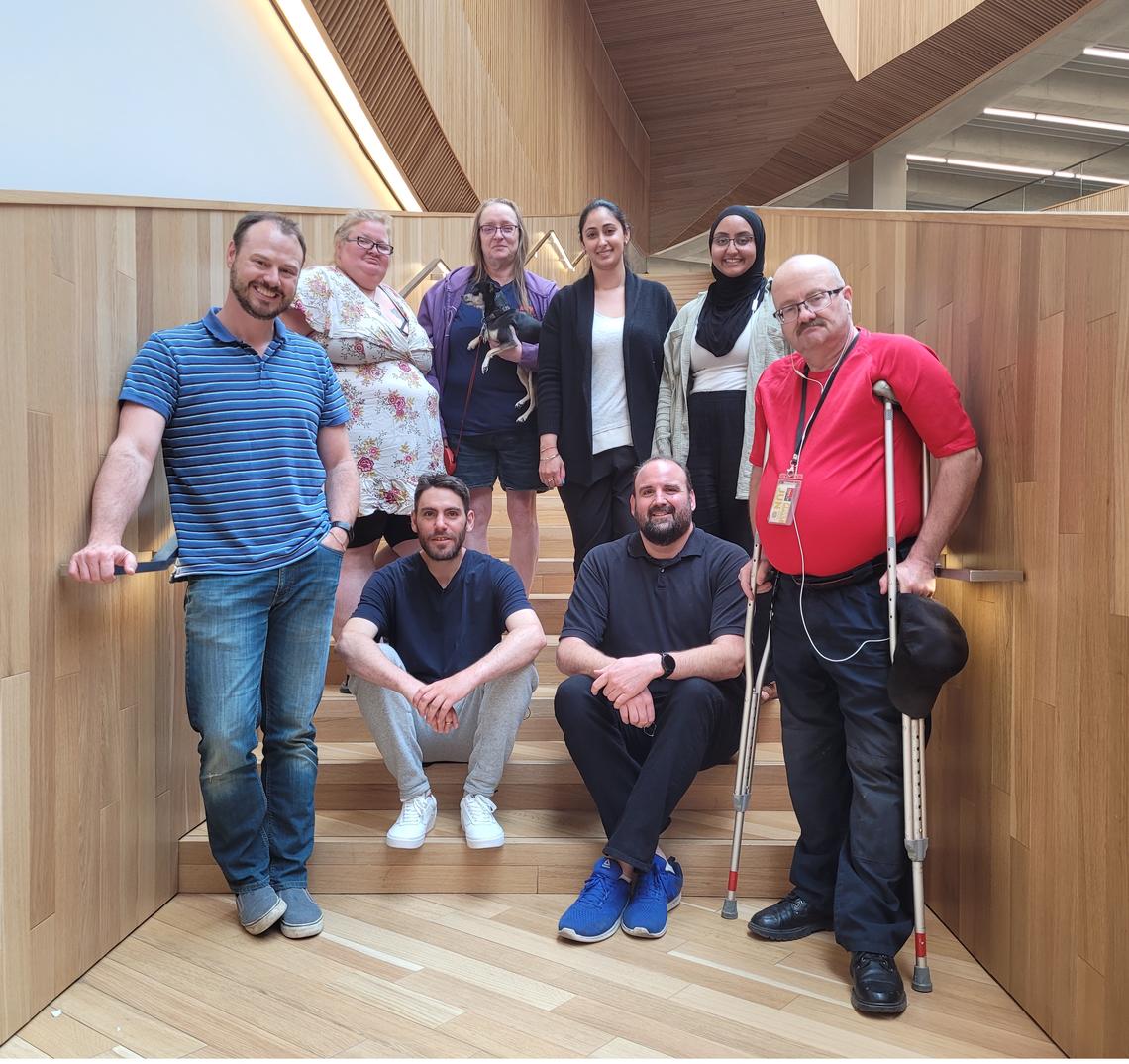
Dr. David Campbell poses with his research group.
Nov. 22, 2022

The Libin Cardiovascular Institute’s Dr. David Campbell, MD, PhD, has a passion for patient-centred research, particularly for those who face social disadvantages.
Campbell, a clinician who specializes in diabetes care, has a strong interest in investigating the intersection of diabetes and homelessness. This important work has gotten him noticed: he was recently recognized in Avenue Calgary’s Top 40 Under 40 awards.
He is humbled and honoured to be chosen for the prestigious award.
“To have this work recognized is special because what I do is often not seen, and the people I work with are also often invisible,” says Campbell. “This brings recognition to an important subject.”
Campbell’s traces his interest in studying homelessness and diabetes to his first year as a medical student at the University of Calgary. That’s when he got involved with the student-run clinic at the Calgary Drop-in Centre where he helped provide primary care to individuals experiencing homelessness.
Campbell is now a preceptor, working with medical students, in the student-led clinic where he runs an evening diabetes clinic at the Mustard Seed, which provides a range of services to individuals who are experiencing both diabetes and homelessness.
It’s a much-needed clinic. According to Campbell, diabetes rates may be twice as high in individuals experiencing homelessness as in those who have a home. Although it can be a difficult population to study, some studies suggest that one in five people experiencing homelessness also have diabetes.
Homelessness also makes managing diabetes more difficult.
Campbell explains that managing diabetes requires a fixed schedule of eating and monitoring blood sugars up to six times a day, with many also needing insulin injections multiples times a day. People with diabetes are also at an increased risk of cardiovascular disease and many are on up to 10 medications to manage other problems associated with the condition.
People with diabetes are also far more likely to suffer from other complications like eye disease, kidney disease and nerve damage that can ultimately lead to infections and even amputation, says Campbell, noting regular screening for a variety of issues is critical.
Campbell developed a new program to screen patients for all these complications in a single visit with his team. This service is offered weekly in conjunction with his partners at the Drop-In Centre and the Mustard Seed.
“Diabetes is a complex condition for anyone to manage,” says Campbell. “If on top of that you don’t have a place to live or are wondering what you are going to eat, it becomes a huge burden. Diabetes gets pushed down the list of priorities, so people end up with numerous complications.”
Overall, individuals in this cohort are far less likely to receive the care they need and more likely to fare worse. According to Campbell, individuals experiencing both homelessness and diabetes are 50 per cent more likely to die, six times more likely to be hospitalized for diabetes and twice as likely to require amputation than those with diabetes who haven’t experienced homelessness.
The magnitude of this problem has motivated Campbell to not only volunteer his time and expertise clinically, but he has also chosen to dedicate much of his research program to studying this demographic.
His team collects data by speaking to those impacted by diabetes and homelessness. His program is unique because it involves community-based participatory approaches, meaning his team is made up of numerous individuals who have lived experience of diabetes and homelessness. (https://news.ucalgary.ca/news/uncommon-experience-ignites-passion-education).
Research questions are also generated by the community and are based on their priorities.
“I empower them to become researchers to study those questions,” says Campbell. “We do research together with them leading the way.”
Recently, the research team chose to focus on the stigma that people experiencing homelessness and diabetes face. The group’s goal is to educate law enforcement and other community workers to recognize how a person experiencing low or high blood sugar may behave.
Campbell can’t say enough about his team.
“I work with amazing trainees, students, staff and the people with lived experience,” he says. “Without them there would be no research program in this area. This Top 40 Under 40 recognition is definitely a team award.”
David Campbell is an assistant professor in the Departments of Medicine, Community Health Sciences and Cardiac Sciences at the Cumming School of Medicine, and a member of the Libin Cardiovascular Institute and the O’Brien Institute for Public Health.

Dr. David Campbell poses with his research group.